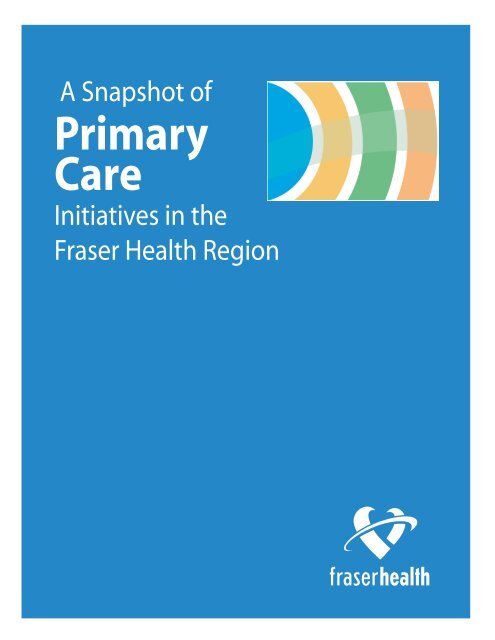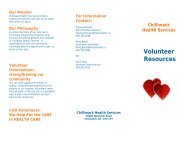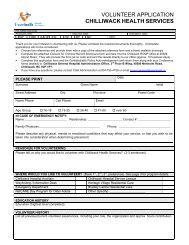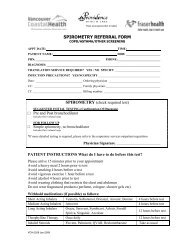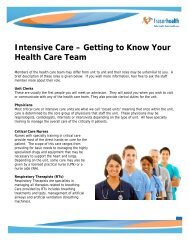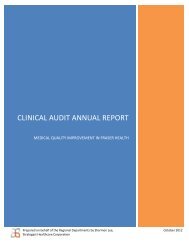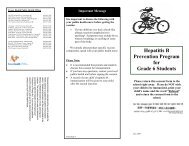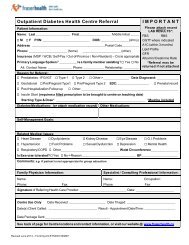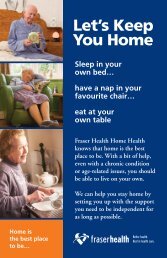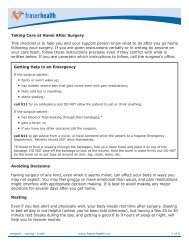Primary Care - Fraser Health
Primary Care - Fraser Health
Primary Care - Fraser Health
Create successful ePaper yourself
Turn your PDF publications into a flip-book with our unique Google optimized e-Paper software.
<strong>Primary</strong> <strong>Care</strong> Initiatives in the <strong>Fraser</strong> <strong>Health</strong> RegionIntroduction: <strong>Primary</strong> <strong>Care</strong> in the <strong>Fraser</strong> <strong>Health</strong> regionPrograms & Initiatives• The iConnect <strong>Health</strong> Network (Integrated <strong>Health</strong> Network)Expanding capacity for providers in a community-based networkCOLOUR KEY• Patient-Centered Support• <strong>Primary</strong> <strong>Care</strong> Support• <strong>Care</strong> in the Community• <strong>Care</strong> for Complexity• Cross System Support• Patient as Partner ProgramEnhancing provider and patient collaboration in everyday practice• Practice Support ProgramCreating a more rewarding, flexible family practice with leading-edge tactics & tools• Integrated <strong>Health</strong> Teams in Enhanced Family PracticesEasing GP workload while improving patient health outcomes in group practices• iConnect <strong>Health</strong> CentresExtending integrated, team-based chronic care to GPs and patients• Non-Government Community PartnershipsExpanding healthy living programs in the community to support GPs and patients• <strong>Health</strong> Services in the CommunityConnecting providers with specialty services for shared care• <strong>Care</strong> CoordinationSupporting family practices with management for complex conditions• Specialist IntegrationBringing together expertise for effective, collaborative care• TIA/Stroke Secondary Prevention ClinicsAccessing rapid stroke assessment with a ‘one signature’ referral processCross System Support• Shared Comprehensive <strong>Care</strong> PlanSupporting care planning and coordination with centralized information technology• Measurement, Evaluation and AccountabilityTracking the effectiveness of programs for providers and patientsPC.04.21.09
<strong>Primary</strong> <strong>Care</strong> in the <strong>Fraser</strong> <strong>Health</strong> regionQUICK FACTS• The <strong>Fraser</strong> <strong>Health</strong> Region encompasses 20 communities from Burnaby in the North, to White Rock inthe South, and Boston Bar in the East.• Is home to 1435 GPs and specialists.• Is the fastest growing health region in Canada, with a patient population of approximately 1.5 million.• 37% of its population is living with multiple chronic conditions, and use 80% of health resources.OVERVIEW OF THE PRIMARY CARE NETWORK IN FRASER HEALTH<strong>Primary</strong> <strong>Care</strong> is recognized by <strong>Fraser</strong> <strong>Health</strong> as the pivotal point of care where health outcomes canbe positively affected.• Family physicians are the cornerstone of primary health care, and constitute its largest workforce.• The primary care professional network also includes nurse practitioners, public health staff,community nurses, midwives, pharmacists, mental health professionals, clinical counsellors,physiotherapists and others.• Home and community care workers, dietitians, specialists, other health professionals and nongovernmentalorganizations work with patients and their families in the primary care community.• Pressures on primary care providers are greater than ever due to an aging and growing population.For this reason, GPs, providers and the health authority are working together to strengthen asupportive network of collaborative, proactive care. Several initiatives available to GPs in the regionhave received funding from the Province of BC for this purpose.… continued on reverse →PC.04.21.09
ASSISTING PROVIDERSThe primary care team working in <strong>Fraser</strong> <strong>Health</strong> exists to enable providers to optimize the health ofpatients they care for. The team works closely with physicians and specialists in the region to:• Provide new programs or systems for GPs, other providers and patients.• Organize optional, compensated education opportunities for providers to learn about new innovationsand practices.• Lobby governments at all levels to support new programs and innovations.• Acquire funding for new programs.• Research innovations and systems, and share best practices and innovations from otherjurisdictions.THE PRIMARY CARE TEAM: BACKGROUNDThe <strong>Primary</strong> <strong>Care</strong> and Chronic <strong>Care</strong> Development team in <strong>Fraser</strong> <strong>Health</strong> was established in 2003 as atemporary team to support <strong>Health</strong> <strong>Care</strong> transition funding.The portfolio was made permanent in 2005 as a result of federal funding and a provincial commitment tomore vigorously support primary care and chronic disease management. Since then, the team has grownfrom 4 to 22. It includes 18 project coordinators who work with local practices and GPs to manage programsand innovations, implement new systems in practices, and organize learning opportunities.Leading the <strong>Primary</strong> <strong>Care</strong> and Chronic <strong>Care</strong> Development team is:• Dr. Brenda Hefford, a White Rock-South Surrey-based GP and former Medical Director of PeaceArch Hospital, as Physician Executive Lead for <strong>Primary</strong> <strong>Care</strong> Development. In this role - the first of itskind in the <strong>Fraser</strong> <strong>Health</strong> region - Dr. Hefford will liaise with GPs, community partners, and regionaland provincial leads.• Colleen Hart, Interim Executive Director• Joan Rabillard, Manager, <strong>Primary</strong> <strong>Care</strong>• Dr. Kemi Odegbile, Manager, Chronic Disease Planning• Lisa Dwyer, Evaluation Services Manager• 18 <strong>Primary</strong> <strong>Care</strong> Project Coordinators who work closely with GPs and practice managers.This package outlines the initiatives available to GPs and other <strong>Primary</strong> <strong>Care</strong> providers in various<strong>Fraser</strong> <strong>Health</strong> communities, as of January 2009.For more information, please visit the following websites:www.fraserhealth.ca/services/primarycarewww. Impactbc.caYou are invited to contact our team at any time:Joan Rabillard, Manager, <strong>Primary</strong> <strong>Care</strong>E-mail: Joan.Rabillard@fraserhealth.caPhone Number: 604.519.8557PC.04.21.09
The iConnect <strong>Health</strong> Network(Integrated <strong>Health</strong> Network)Expanding capacity forproviders in a communitybasednetworkGPs can more readily respond to increasingnumbers of patients with chronic conditions,by participating in the iConnect <strong>Health</strong>Network.Also called an ‘integrated health network’, thisis a new system that supports thecoordination of comprehensive care, providedby multi-disciplinary partners. It is designed tostreamline the numerous health care needs ofpatients living with multiple conditions.To date, the network has been established inthree communities: White Rock-South Surrey,Surrey and New Westminster.A high-level view of the patient-centered iConnect<strong>Health</strong> Network shows points where care isdelivered across the system. The patient isconsidered a partner in prevention and self-care.In collaboration with their GP, they can accessexpanded support from the health care communityas needs become more complex.What is its purpose?An integrated health network is designed to support GPs and their patients living with multiple orcomplex chronic conditions. Enhanced services are provided outside of the practice, in the community.Multi-disciplinary teams and community partners provide coordinated care for a range of conditions, with afocus on guiding patients to a better health status with disease prevention and self-management strategies.The integrated approach expands access to a wider range of chronic care services that can meet a patient’scomplete health needs, to improve their overall health and quality of life.An integrated health network is not a place, but a system, with many delivery points.How does it work?Instead of working independently, health providers agree to work together across the spectrum of services toshare and coordinate care. They proactively plan for a person‘s range of health needs over the long term.… continued on reverse →PC.04.21.09
Three iConnect <strong>Health</strong> Centres have been established in the region, each serving as one delivery point ofmany in the broader network. These centres consolidate and integrate a number of chronic diseasemanagement services, and link together various providers.The Most Responsible Provider – usually the family doctor – directs overall care. He or she may connect apatient with one or more partners in the network, such as a dietician for diabetes care, a mental healthspecialist for depression, or a pharmacist for medication management.Complex <strong>Care</strong> Coordinators also work in the system to coordinate providers and care planning for patientswho have multiple, complex conditions.How do providers and patients benefit?An integrated health network has many benefits for patients, providers and the system. It:• Improves health for people with multiple chronic conditions: Planned and coordinated care – ratherthan separate services responding to single health issues – optimizes overall health.• Improves a patient’s experience and satisfaction as they access services in the system, with morecontinuity of care, less run-around and stronger relationships with care providers.• Increases a patient / client’s confidence and sense of control as they gain knowledge and tactics tomanage their own health.• For GPs and other providers, the network expands capacity for chronic care beyond practices andinto the community, and eases the load on individual providers.• For GPs and other providers, it improves professional satisfaction as it saves time, reducesduplication and improves feedback with fewer communication gaps.• It also reduces costs for the health care system as a whole, through prevention and bettermanagement of disease, and more effective use of primary care, local and regional resources.When and where is this being implemented?In 2008, the iConnect <strong>Health</strong> Network was established in the community of White Rock/South Surrey. Thenetwork is being gradually expanded in New Westminster and Surrey. It will be introduced to othercommunities over the next five years as it is evaluated and refined for its effectiveness.In total, 25 integrated health networks were established across British Columbia in 2008.Opportunities for GPs to participateGPs in White Rock/South Surrey, New Westminster and Surrey are invited to participate in and access theavailable services of the iConnect <strong>Health</strong> Network, and can sign up via a consent process. (Contact below.)Opportunities for providers in the <strong>Fraser</strong> <strong>Health</strong> region: www.fraserhealth.ca/services/primarycareContact informationJoan Rabillard, Manager, <strong>Primary</strong> <strong>Care</strong>E-mail: Joan.Rabillard@fraserhealth.caPhone Number: 604.519.8557For sign-up consent, please contact: Norah.Wong@fraserhealth.caPC.04.21.09
Patient as Partner ProgramEnhancing provider and patient collaborationin everyday practiceStudies show that when health care providers, patients andfamilies work in partnership, the quality and safety of careincreases, costs decrease, and satisfaction for both partiesimproves. A patient or family member’s experience is a keyfactor in affecting outcomes.”– Institute for Family Centered <strong>Care</strong>The Patient as Partner program equips GPs with practical strategies to collaborate with patients atthe clinical level, to guide them to assume more responsibility for their health management. It alsoprovides ways for patients’ perspectives to be represented in the planning of health care services.What is its purpose?The aim of the Patient as Partner program is to improve the quality and experience of care for physicians,patients and families. Its strategies help to increase a patient’s health literacy and confidence as aparticipating partner in managing their own health, and:• Support patients to practice prevention and to self-manage.• Create individual action plans.• Involve patients’ perspectives in planning health care programs and policies.How does it work?1) Education Series: supports the day-to-day application of patient and family-centred care in afamily practice. This series of practical sessions is designed for GPs and their patients, and delivered by<strong>Fraser</strong> <strong>Health</strong> <strong>Primary</strong> <strong>Care</strong> team in collaboration with the Institute for Family Centered <strong>Care</strong>. It providesmethods of enhancing collaboration and communication between providers and patients, along with selfmanagementapproaches and tools.2) Patients in Advisory Roles. Patients have been invited to participate in <strong>Primary</strong> <strong>Care</strong> planning meetingsin the region, to share their perspectives and ensure they are represented in future planning. For example, inWhite Rock-South Surrey, several patients are participating on advisory committees around the planning ofnew services.… continued on reverse →PC.04.21.09
How do providers and patients benefit?Participants gain knowledge and tactics to increase collaboration between GPs, patients and families, withthe aim of improving the experience of care and clinical outcomes.• Providers are relieved of some burden as patients are guided to assume more appropriateresponsibility for their own health, prevention and self-management.• Providers can gain more efficient patient management, and increased practice efficiency.• The approach supports a shift from reactive to more proactive and preventive care, to reducepressures on providers as well as the system.• As patients and their families are more integrated in care as informed partners, they will also benefitfrom stronger choice, voice and role.When and where is this happening?• Patient as Partner activities and education series starts in January 2009.• Patients are participating in planning committees starting in 2009 in the three Integrated <strong>Health</strong>Networks in White Rock/South Surrey, New Westminster and Surrey.Opportunities for GPs to participate• The Education Series is open to all GPs in the <strong>Fraser</strong> <strong>Health</strong> region. Visit the website link below for alist of dates and information.• GPs are compensated for their time during and between the Learning sessions at GP sessionalrates.Additional information and resourcesInstitute for Family Centered <strong>Care</strong>: www.familycenteredcare.orgPatient as Partner Information & Publications: www.impactbc.ca/PatientsasPartnersPrograms for providers in the <strong>Fraser</strong> <strong>Health</strong> region: www.fraserhealth.ca/services/primarycareContact informationPamela Fennell, Patient as Partner Project CoordinatorE-mail: Pamela.Fennell@fraserhealth.caPhone Number: 604.519.8542PC.04.21.09
Practice Support ProgramCreating a more rewarding, flexible familypractice with leading-edge tactics & tools"I’ve been able to take on a number of new patients with thenew way we’re running the practice. It’s better care. It allowsme to capitalize on some of that higher-volume, lower-acuitymedicine. My patients enjoy coming to see me, so if I’m havinga good day, my patients are having a good day."– Dr. Alex Bartel, ChilliwackGPs and MOAs are invited to participate in compensated, physician-led sessions to learn about newtechniques that increase efficiencies and enhance the capacity of a practice. When applied, theseapproaches can help to create a more satisfying experience for providers and patients.What is its purpose?The PSP program is designed to assist practices to:• Integrate new ideas and processes into clinical practices and practice management.• Help improve access and best care for patients.• Make working conditions more manageable and fulfilling.How does it work?The province-wide program developed by the BCMA and GPSC and delivered by each health authority,provides family physicians and medical office assistants with incentives, training and technical support. Itincludes:• Learning modules and materials designed for application in primary care clinical practices.• Compensation for family physicians and medical office assistants (MOAs) to attend.• Project coordinators to support implementation in the practice.• Ongoing practice support for family physicians and their clinical staff.Each Learning Session is 3.5 hours long and co-facilitated by a GP lead who is involved in programdevelopment and delivery. Each Module encompasses 3 to 8 Learning Sessions. Modules and programmaterials reference best practices and leading-edge approaches to clinical practice operations, including:• Office efficiency• Chronic Disease Management (CDM)• Mental <strong>Health</strong> Management (launching in spring, 2009)… continued on reverse →PC.04.21.09
How do providers, practices and patients benefit?Participating GPs and MOAs are experiencing:• Increased efficiency.• Space in the schedule to accept new patients.• Greater provider and patient satisfaction.• More effective partnerships with patients.They are also observing ‘happier,’ more satisfied patients, with:• Improved coordination of care between their family physician and other health services.• Increased access for patients to see the family physician in a timely fashion, including the same day.• <strong>Care</strong> that meets evidence-based clinical guidelines.When and where is this happening?Nearly 500 health professionals (one out of five GPs) in the <strong>Fraser</strong> <strong>Health</strong> region have participated in PSPmodules since it was introduced in 2007. Learning Sessions will continue through 2009 for GPs in theregion.Opportunities for GPs to participateAll learning modules are optional and voluntary - involvement with the Practice Support Program is entirelyat the discretion of each physician or practice.Modules start at various times throughout the year, and all GPs across <strong>Fraser</strong> <strong>Health</strong> are welcome to attend.Please see our calendar with this package or visit the website atwww.fraserhealth.ca/services/primarycare.PSP meets the accreditation criteria of the College of Family Physicians of Canada.Additional information and resources:Program information: www.impactbc.ca/practicesupportPSP in the <strong>Fraser</strong> <strong>Health</strong> region: www.fraserhealth.ca/services/primarycareContact informationCatherine Torrance, PSP Project CoordinatorE-mail: psp@fraserhealth.caPhone number 604.519.8585PC.04.21.09
Integrated <strong>Health</strong> Network Teams(Enhanced Family Practices)Easing GP workload while improving patienthealth outcomes in group practices“Enhanced Family Practices have made all of us betterdoctors, because we now have a way of following our patientsvery accurately. I would say the EFP has probably given meanother 5 to 10 years of practice. I’m less stressed than I wastwo years ago, and now have more time to spend with mypatients. I am a much happier person.”− Dr. Glenn Anderson, GP, White Rock MedicalPhysicians in group practices are providing enhanced, comprehensive care for patients with chronicconditions, with the support of an electronic medical record and dedicated, CDM-focused nurse. Thisapproach has resulted in measurable improvements in the health status of many patients.What is its purpose?Its aim is to expand the capacity of a group practice to optimize the health of patients with chronic illnesses,and achieve key goals, called Triple Aim +:• Improve population health.• Optimize the patient experience.• Ensure the effective use of health system resources.+ Enhance provider satisfaction.How does it work?Participating practices are provided one-time funding and support from a <strong>Fraser</strong> <strong>Health</strong> project coordinator toimplement key enhancements to the practice, including the integration of:• A CDM-focused Nurse, who provides education, coordinates care and arranges follow-up.• An Electronic Medical Record that enables the flow of information and tracks patients’ progress.• An optimized Chronic Disease Management system that supports GPs with guidelines andinformation.… continued on reverse →PC.04.21.09
How do providers and patients benefit?Physicians in these practices are reporting greater satisfaction and an improved practice environment.Sharing care coordination and follow-up with the RN has led to more efficient patient management,expanded capacity for additional / other patients, and has enabled greater adherence to clinical practiceguidelines.Patients are seeing measurable improvements in their health status. It also gives them:• More timely access to patient-centered care in the community.• More continuity of care.• More effective chronic disease management.• More support for prevention and self-management.When and where is this being implemented?Since 2006, 26 IHN Teams have been established in the communities of White Rock, Surrey, Langley,Abbotsford, Mission, Maple Ridge, and Burnaby.Opportunities for GPs to participateFunding for variations of the Enhanced Family Practice model is currently being sought by <strong>Fraser</strong> <strong>Health</strong> toprovide enhancements to even more practices. Physicians or practices that would like to be consideredshould funding come available, are welcome to contact us.Contact informationJoan Rabillard, Manager, <strong>Primary</strong> <strong>Care</strong>E-mail: Joan.Rabillard@fraserhealth.caPhone Number: 604.519.8557PC.04.21.09
iConnect <strong>Health</strong> CentresExtending integrated, team-based chroniccare to GPs and patients"My life-saving doctors Dr. Evelyn Shukin and Dr. Mark Turnerrecommended me to the Centre after a quintuple heart bypass.Today I can say I am on top of it. The knowledge about a healthylifestyle; the encouragement and the camaraderie at the Centre areabsolutely phenomenal. I would never have developed the samecommitment alone at home."– Ken Phillips, participant in the iConnect <strong>Health</strong> Centreintegrated exercise group, White Rock / South SurreyGPs can refer patients with multiple chronic conditions to iConnect <strong>Health</strong> Centres for enhancedmulti-disciplinary care, self-management coaching and group education. The Centres represent onecomponent of many in the iConnect <strong>Health</strong> Network, which GPs can access for chronic careservices.What are their purpose?The iConnect <strong>Health</strong> Centres were established to help primary care providers manage the increasing needfor disease management services, with a goal to improve a patient’s health outcomes. The Centres:• Bring together multi-disciplinary teams from across the range of services.• Coordinate chronic care services to maximize resources and avoid duplication.• Integrate services to address multiple conditions and health needs.• Guide patients into a more knowledgeable role of prevention and self-management.How do they work?The iConnect <strong>Health</strong> Centres are designed to meet a patient’s range of chronic care needs. Services suchas diabetes education, respiratory rehabilitation and cardiac rehabilitation – which in the past wereseparately located in hospitals – are consolidated and integrated at the Centre, offering:• Assessments & <strong>Care</strong> Planning• Cardiac rehabilitation• Diabetes education• Mental <strong>Health</strong> services• Pharmacist support• Specialists• Links with community programs<strong>Health</strong>y Living classes including:• Nutrition education• <strong>Health</strong>y weight loss• Managing blood pressure• Managing cholesterol• Medication management• Prevention and Self-<strong>Care</strong>• Specialty Exercise… continued on reverse →PC.04.21.09
How are providers and patients benefiting?• Providers are able to delegate some care for patients with complex chronic conditions to a multidisciplinaryteam. This contributes to increased practice efficiencies and greater satisfaction for GPsas patients receive the support they need.• Patients receive coordinated, comprehensive and integrated care, built around their long-term, wholehealth needs. A shift from reactive to proactive care, supported by a self-management focus, canhelp patients prevent disease from worsening, and lead to improved health outcomes.Where are the Centres located?• Currently, there are three iConnect <strong>Health</strong> Centres: 1) White Rock / South Surrey next to Peace ArchHospital 2) New Westminster at Victoria Hill, and 3) at Surrey Memorial Hospital.• These are important service delivery points in the wider iConnect <strong>Health</strong> Network for theconsolidation and coordination of chronic care services.Opportunities for GPs to participate• GPs may refer patients from White Rock / South Surrey, New Westminster and Surrey to iConnect<strong>Health</strong> Centres in those communities, and collaborate with the Centre’s multidisciplinary team tosupport a coordinated care plan.• A referral and feedback process has been developed by GPs to keep everyone in the loop, with theGP typically retaining the Most Responsible Physician role.Additional informationBeginning in January 2009, patients accessing iConnect <strong>Health</strong> Centres in the three communities and theirGPs, will be encouraged to participate in a voluntary, informed consent process so that the program can beevaluated for its effectiveness, and fine-tuned for expansion throughout the region.Contact information• White Rock / South SurreyTel: 604-541-7162• New WestminsterTel: 604-523-8800• Surrey Memorial HospitalTel: 604-585-5697PC.04.21.09
Non-government CommunityPartnershipsExpanding healthy living programs in thecommunity to support GPs and patientsAn increasing number of healthy living and chronic diseasemanagement programs are being extended to GPs and patientsby community agencies. A number of organizations are workingin partnership with <strong>Fraser</strong> <strong>Health</strong> to identify needs and gaps andcoordinate new programs in our communities.What is its purpose?Non-government organizations are working formally with primary care providers and teams in the <strong>Fraser</strong><strong>Health</strong> region to improve coordination and provision of healthy living services in the community.Their aim is to assist providers meet the increasing need for disease prevention and management servicesin the community setting.How does it work?In the iConnect <strong>Health</strong> Network (<strong>Fraser</strong> <strong>Health</strong>’s integrated health network), a number of communitypartnerships are in the process of being formalized for the provision of programs. This includes:• Heart and Stroke Foundation• Canadian Diabetes Association• Alzheimer Society• Community Foundations• Community & City Recreation GroupsThe partners are working together to:• Assess available services and identify gaps.• Identify and resolve issues together with providers and the health authority.• Exchange information and keep all participants informed about each others’ activities.… continued on reverse →PC.04.21.09
How do providers and patients benefit?• Community partnerships expand healthy living services that GPs can make available to patients.• They offer programs in closer-to-home, safer and more comfortable locations, and in group settings,which can help improve patients’ compliance with care recommendations.• The partnerships inject creativity and innovation to system design as a more diverse set ofperspectives is brought into the process.• A formalized coordination of services with agencies can expand available programs while reducingfragmented or duplicated services.When and where is this being implemented?• In White Rock-South Surrey, a major community partnership is in progress for the development of theCentre for <strong>Health</strong> Improvement.• Community agencies in White Rock-South Surrey, New Westminster and Surrey were invited toprovide enhanced chronic disease services in these communities in 2009. As a result, <strong>Fraser</strong> <strong>Health</strong>,through the Ministry of <strong>Health</strong> Services, is funding five new services:• Punjabi Chronic Disease Self-Management Program: Development of a Chronic Disease Self-Management Program for the Punjabi speaking adult population of Surrey.• The Disabled Women’s Program: A safe, supportive, warm and friendly learning environmentfor women living with chronic conditions.• <strong>Health</strong>y Eating/Cooking for South Asians DVD: Educational DVD in Punjabi for South Asianindividuals diagnosed with chronic conditions on how to create and incorporate a healthy eatingand cooking lifestyle, with a focus on Type 2 Diabetes.• Punjabi Educational Learning Series Presentations and Ask the Expert Sessions: ForSouth Asian individuals living with Type 2 Diabetes about diabetes prevention and management,and complications. “Ask the Expert” topics include nutrition, physical activity, medicationinformation, services and resources.• Stroke Community Linkage Project: Coordinated Community Linkages Program for strokesurvivors and their caregivers living in Surrey and White Rock to facilitate reintegration into thecommunity and engagement in meaningful occupation and family and social roles.Opportunities for GPs to participateGPs are welcome to give input into community partnership development by submitting information or joininga meeting in person.Program ContactLisa Dwyer, Evaluation Services ManagerE-mail: Lisa.Dwyer@fraserhealth.caPhone number: 604.517.8620PC.04.29.09
<strong>Health</strong> Services in the CommunityConnecting providers with specialty healthservices for shared care“Together with community services we are able to providean all-inclusive program to keep patients at home andsafe. We know our patients are in great hands and reallylooked after. The communication and coordination backand forth is fantastic. This is a great example what it lookslike to provide better, more comprehensive care.”– Dr. Glenn Anderson, GP, White Rock Medical(Referencing collaborative care with Elder <strong>Health</strong>services)<strong>Primary</strong> <strong>Care</strong> providers who are treating patients with numerous health-related needs can refer themto wide range of specialty services available throughout the <strong>Fraser</strong> region.What is their purpose?GPs can refer patients for assessments or services to a number of programs delivered in the community,while maintaining the Most Responsible Physician role of directing care. These include:• Programs and services for patients with mental health and addictions issues:o Support for depression, low mood, cognitive behavioral therapy, and other mental healthand/or addictions issues.• Support in the home for individuals who are living with a chronic medical condition, a lifelimitingcondition, or are having a difficult time managing on their own; or for people whoneed post-hospital care.o Extensive services in the home include home support for everyday living; home care nursing;wound care; IV therapy; and physiotherapy.• Specialized health care services for seniors:o Specialized seniors clinics; programs for frail elderly with complex conditions; fall and injuryprevention; disease management; medication management.• Specialized services for people living with one or more chronic diseases:o Diabetes Centres (for insulin starts, prevention and self-management education); Cardiacrehabilitation programs; respiratory rehabilitation / COPD management; extensive renalprograms and services.… continued on reverse →PC.04.21.09
• Services and support for new Canadians (immigrants and refugees)o Two primary care clinics in Surrey and Burnaby for new immigrants and refugees, withmultidisciplinary health care providers, and formal links to community and social supports.• Public <strong>Health</strong> services and support for GPso Immunization programs; smoking cessation support; HIV and AIDS awareness programs;influenza serums.How do providers and patients benefit?• Collaborative, ‘shared care’ can assist GPs to address a patient’s range of health issues. It alsoeases some of the pressures experienced by primary care providers in managing care for morecomplex patients.• A comprehensive, team approach improves the overall quality of care, and improves the health andwell being of many patients.Opportunities for GPs to participateServices are available to providers and patients in all communities in the <strong>Fraser</strong> <strong>Health</strong> region. GPs mayrefer directly to any of the community programs. (See attachment for a list of many of these programs.)More information:• Mental <strong>Health</strong> and Addictions – services, programs and facilities are provided in all communities inthe region. To access information, visit: www.fraserhealth.ca/services/mentalhealthandaddictions• Home <strong>Health</strong> – A downloadable guide is available describing all services, eligibility, intake processand list of community office locations. www.fraserhealth.ca/Services/HomeandCommunity<strong>Care</strong>• Seniors <strong>Health</strong> (also called Elder <strong>Health</strong>) – Many services are available across the region, whichcan be accessed through: www.fraserhealth.ca/services/seniorshealth• Specialized Geriatric Clinics – Integrated care for seniors living with complex conditions in Surrey,Abbotsford and Mission. www.fraserhealth.ca/services/seniorshealth/GeriatricOutpatientServices• Chronic Disease Management Services – These include three iConnect <strong>Health</strong> Centres, along withdiabetes education centres and cardiac rehabilitation programs, respiratory rehabilitation andcomprehensive renal services. www.fraserhealth.ca/<strong>Health</strong>Topics/DiseaseManagement• New Canadian Clinics – these meet the specialized needs of new immigrants and refugees,including linking individuals to social supports: www.fraserhealth.ca/Services/Public<strong>Health</strong>• Public <strong>Health</strong> Services – 21 Public <strong>Health</strong> offices: www.fraserhealth.ca/Services/Public<strong>Health</strong>A list of all health services in the region are now accessible at the 811 <strong>Health</strong>Link BC Directory.Visit www.healthlinkbc.ca or dial 8-1-1.PC.04.21.09
<strong>Health</strong> Services in the CommunitySPECIALIZED SERVICES AND CLINICSINTEGRATED HEALTH CENTRES(A component of the iConnect <strong>Health</strong> Network)White Rock - South SurreyiConnect <strong>Health</strong> Centre15455 Vine Avenue,White Rock, BC V4B 2T3Phone: 604-541-7162Fax: 604-538-9809New WestminsteriConnect <strong>Health</strong> Centre(at Victoria Heights)230 Ross Drive,New Westminster, BCPhone: 604-523-8800SurreyiConnect <strong>Health</strong> CentreDiabetes Services13750-96 Ave.Surrey, B.C., V3V 1Z2Phone: 604-585-5697Fax: 604-585-5628SENIORS SPECIALIZED CLINICSSENIORS FIRST HEALTH CLINICSurrey and North DeltaGateway ScotiaBank Tower1300 – 13401 – 108th AvenueSurrey BC V3T 5T3Phone: 604-953-4919 Fax: 604-953-4953SENIORS CLINICAbbotsford and MissionAbbotsford Regional HospitalAbbotsford, BC V2S 3P1Phone: 604-851-3056 Fax: 604-557-2086SPECIALIZED GERIATRIC CLINICSNEW WESTMINSTER SPECIALIZEDGERIATRIC CLINIC230 Ross DriveNew Westminster, BC V3L 0B2Tel: 604-528-5031Fax: 604-528-5030NEW CANADIAN CLINICSNEW CANADIAN CLINIC, BURNABY7423 Edmonds StBurnaby, BC V3N 1B1Tel: 604-528-5077NEW CANADIAN CLINIC, SURREY#1113 - 7330-137 StSurrey, BC V3W 1A3Tel: 604-953-5033ELDERHEALTH SPECIALIZEDGERIATRIC CLINIC – WHITE ROCKPeace Arch HospitalBerkeley Pavilion15476 Vine AvenueWhite Rock, BC V4B 2R4Tel: 604-535-4577Fax: 604-535-4587PC.04.21.09
DIABETES EDUCATION SERVICESAbbotsford Regional Hospital (ARH) DiabetesEducation CentreSumas Level 232900 Marshall Rd.Abbotsford, BC V2S 0C2Phone: 604-851-4700 Extension 646238Fax: 604-851-4782Chilliwack General Hospital and <strong>Fraser</strong> CanyonHospital Diabetes Education Centre45600 Menholm RoadChilliwack, BC V2P 1P7Phone: 604-702-4766Fax: 604-702-2880Mission Memorial Hospital Diabetes EducationCentre7324 Hurd StreetMission, BC V2V 3H5Phone: 604-814-5145Fax: 604-814-5108Diabetes Outreach serving remote communitiesand First NationsPhone: 604-706-4766 to bookBurnaby Risk Reduction Centre DiabetesManagement Program3935 Kincaid StreetBurnaby, B.C., V5G 2X6Phone: 604-412-6139Fax: 604-412-6233Eagle Ridge Hospital Diabetes Centre475 Guildford Way,Port Moody, BC V3H 3W9Phone: 604-469-3112Fax: 604-469-5101New WestminsteriConnect <strong>Health</strong> Centre(at Victoria Heights)230 Ross Drive,New Westminster, BCPhone: 604-523-8800Ridge Meadows Diabetes Centre400 - 22470 Dewdney Trunk RoadMaple Ridge, BCV2X 5Z6Phone: 604-476-7056Fax: 604-476-7077Royal Columbian Hospital - Diabetes InPregnancy Clinic330 East Columbia StreetNew Westminster, BCV3L 3W7Phone: 604-520-4473Send all referrals to the offices of Dr. J. Leeand Dr. J. KlinkePhone: 604-520-1135Fax: 604-520-1132Delta Hospital Diabetes Education Centre5800 Mountain View Blvd.Delta, B.C V4K 3V6Phone: 604-946-1121 Loc. 278Fax: 604-952-7352Langley Memorial Hospital DiabetesEducation Centre22051 <strong>Fraser</strong> HwyLangley, BC V3A 4H4Phone: 604-533-6407Fax: 604-533-6449SurreyiConnect <strong>Health</strong> CentreDiabetes Services13750-96 Ave.Surrey, B.C., V3V 1Z2Phone: 604-585-5697Fax: 604-585-5628White Rock - South SurreyiConnect <strong>Health</strong> Centre15455 Vine Avenue,White Rock, BC V4B 2T3Phone: 604-541-7162Fax: 604-538-9809PC.04.21.09
HOME HEALTH OFFICESAbbotsford Home <strong>Health</strong>Unit 103 – 34194 Marshall Rd.Abbotsford, BC V2S 5E4Phone: 604-556-5000Fax: 604-556-5010Agassiz Home <strong>Health</strong>7243 Pioneer AvenueAgassiz, BC V0M 1A0Phone: 604-793-7160Fax: 604-796-8587Burnaby Home <strong>Health</strong>400 – 4946 Canada WayBurnaby, BC V5G 4H7Phone: 604-918-7447Fax: 604-918-7631Chilliwack Home <strong>Health</strong>45470 Menholm RoadChilliwack, BC V2P 1M2Phone: 604-702-4800Fax: 604-702-4801Hope Home <strong>Health</strong>1275A 7th AvenueHope, BC V0X 1L4Phone: 604-860-7747 Fax: 604-860-7742Langley Home <strong>Health</strong>#101 – 20651 56th AvenueLangley, BC V3A 3Y9Phone: 604-532-6500 Fax: 604-532-9642Maple Ridge Home <strong>Health</strong>Suite 400 – 11762 Laity StreetMaple Ridge, BC V2X 5A3Phone: 604-476-7100 Fax: 604-476-7126Mission Home <strong>Health</strong>32618 Logan AvenueMission, BC V2V 6C7Phone: 604-814-5520 Fax: 604-814-5517Newton Home <strong>Health</strong>1009 – 7495 – 132nd StreetSurrey, BC V3W 1J8Phone: 604-572-5340 Fax: 604-572-5349New West Home <strong>Health</strong>57– 6th StreetNew Westminster, BC V3L 2Z3Phone: 604-777-6700 Fax: 604-777-6762South Delta Home <strong>Health</strong>4470 Clarence Taylor CrescentDelta, BC V4K 3W3Phone: 604-952-3552 Fax: 604-946-6953Surrey and North Delta Home <strong>Health</strong>Gateway ScotiaBankTower 1500 – 13401 – 108th AvenueSurrey, BC V3T 5T3Phone: 604-953-4950Fax: 604-953-4951Tri-Cities Home <strong>Health</strong>#6 – 2601 Lougheed HwyCoquitlam, BC V3C 4J2Phone: 604-777-7300 Fax: 604-777-7302White Rock Home <strong>Health</strong>15476 Vine StreetWhite Rock, BC V4B 5M2Phone: 604-541-6800 Fax: 604-541-6872PC.04.21.09
MENTAL HEALTH OFFICESAbbotsfordAbbotsford Mental <strong>Health</strong> Centre11-32700 Dahlstrom Ave., Abbotsford V2T 4V6Phone: 604-870-7800BurnabyBurnaby Central Mental <strong>Health</strong> Centre3935 Kincaid St, Burnaby V5G 2X6Phone: 604-453-1900Burnaby North Mental <strong>Health</strong> Centre206- 3900 East Hastings St, Burnaby V5C 6C1Phone: 604-949-7730Burnaby South Mental <strong>Health</strong> Centre320- 7155 Kingsway, Burnaby V5E 2V1Phone: 604-777-6870ChilliwackChilliwack Mental <strong>Health</strong> Centre45470 Menholm Rd, Chilliwack V2P 1M2Phone: 604-702-4860DeltaDelta Mental <strong>Health</strong> Centre - North129 - 6345 120th St, Delta V4E 2A6Phone: 604-592-3700MissionMission Mental <strong>Health</strong> Centre101-33070 5th Ave, Mission V2V 1V5Phone: 604-814-5600New WestminsterNew Westminster Mental <strong>Health</strong> Centre2nd Floor 403 Sixth St, New WestminsterV3L 3B1Phone: 604-777-6800SurreySurrey Mental <strong>Health</strong> & Addictions#1100 13401 108th Ave, SurreyPhone: 604-953-4900Tri-CitiesTri-Cities Mental <strong>Health</strong> Centre1 - 2232 Elgin Ave, Port Coquitlam V3C 2B2Phone: 604-777-8400White RockWhite Rock/South Surrey Mental <strong>Health</strong> &AddictionsPeace Arch Hospital, Russell Unit, 15521Russell Ave, White Rock V4B 2R4Phone: 604-541-6844Delta Mental <strong>Health</strong> Centre - South15-1835 56 St, Delta V4L 2L8Phone: 604-948-7010<strong>Fraser</strong> Valley<strong>Fraser</strong> Valley/West Coast Mental <strong>Health</strong> SupportTeams207 - 2248 Elgin Ave, Port Coquitlam V3C 2B2Phone: 604-777-8475HopeHope Mental <strong>Health</strong> Centre1275A 7th Ave, Hope V0X 1L4Phone: 604-860-7733LangleyLangley Mental <strong>Health</strong> Centre305 - 20300 <strong>Fraser</strong> Highway, Langley V3A 4E6Phone: 604-514-7940PC.04.21.09
PUBLIC HEALTH OFFICESAbbotsford104-34194 Marshall RoadAbbotsford, BC V2S 5E4Tel: (604) 864-3400 Fax: (604) 864-3410AgassizBox 104, 7243 Pioneer Ave.Agassiz, BC V0M 1A0Tel: (604) 793-7160 Fax: (604) 793-7161Burnaby300-4946 Canada WayBurnaby, BC V5G 4H7Tel: (604) 918-7605 Fax: (604) 918-7630Chilliwack45470 Menholm RoadChilliwack, BC V2P 1M2Tel: (604) 702-4900 Fax: (604) 702-4901CloverdaleSuite #205 – 17700 56th AveCloverdale, BC V3S 1C7Tel: (604) 575-5100 Fax: (604) 574-3738Delta - North11245-84 Avenue, Delta, BC V4C 2L9Tel: (604) 507-5400 Fax: (604) 507-4617Delta - South4470 Clarence Taylor CrescentDelta, BC V4K 3W3Tel: (604) 952-3550 Fax: (604) 946-6953HopeBox 176, 444 Park StreetHope, BC V0X 1L0Tel: (604) 860-7630 Fax: (604) 869-2332Langley20389 <strong>Fraser</strong> HighwayLangley, BC V3A 7N2Tel: (604) 539-2900Maple Ridge400-22470 Dewdney Trunk RoadMaple Ridge, BC V2X 5Z6Tel: (604) 476-7000 Fax: (604) 476-7077Mission32618 Logan Ave.Mission, BC V2V 6C7Tel: (604) 814-5500 Fax: (604) 814-5517New Westminster537 Carnarvon StreetNew Westminster, BC V3L 5B3Tel: (604) 777-6740 Fax:(604) 525-0878Port Coquitlam2266 Wilson AvePort Coquitlam, BC V3C 1Z5Tel : 604-777-8700SurreyMaxxine Wright Community <strong>Health</strong> Centre13729 92 Avenue, Surrey, BC V3V 1H9Tel: (604) 587-3835Surrey – Guildford100-10233 153 StreetSurrey, BC V3R 0Z7Tel: (604) 587-4750 Fax: (604) 587-4777Surrey – Newton200-7337 137 StreetSurrey, BC V3W 1A4Tel: (604) 592-2000 Fax: (604) 501-4814Surrey – North220-10362 King George HighwaySurrey, BC V3T 2W5Tel: (604) 587-7900 Fax: (604) 582-4811Tri-Cities200-2005 Newport DrivePort Moody, BC V3H 5C9Tel: (604) 949-7200 Fax: (604) 941-2409White Rock15476 Vine AvenueWhite Rock, BC V4B 5M2Tel: (604) 542-4000 Fax: (604) 542-4009PC.04.21.09
<strong>Care</strong> CoordinationSupporting family practices with casemanagement for complex conditions“Many clients are elderly and isolated. They are so pleasedwith this intervention and feel much more in control. Weprovide the time and resources necessary, including makinghome visits, to thoroughly assess the whole patient situation,and quickly make the right connections for them within ourcomplex system.”– Nancy MacDonald, <strong>Care</strong> Coordinator,iConnect <strong>Health</strong> Network, White Rock-South Surrey<strong>Primary</strong> care providers can help patients navigate various services in the system with greater easeand efficiency, using care coordination services provided in the iConnect <strong>Health</strong> Network.What is its purpose?<strong>Care</strong> coordination services help physicians, patients and families navigate health care services moreeffectively by:• Coordinating continuity of care between multiple providers and services.• Ensuring all necessary connections are made and followed up.• Ensuring all relevant information is documented, exchanged and updated.How does it work?• Currently, there are plans to establish <strong>Care</strong> Coordinators in all three iConnect <strong>Health</strong> Networkcommunities – White Rock/South Surrey, Surrey and New Westminster.• <strong>Care</strong> coordination is available for patients with multiple, complex needs; for example, a frail elderlyperson with co-morbidities who requires a number of services.• Physicians send referrals for these patients to the <strong>Care</strong> Coordinator. Under direction from the GP, theCoordinator plans and organizes treatment, services and providers.• Feedback and progress reports are provided to the GP to ensure the patient’s care plan is on trackand needs are met.• <strong>Care</strong> coordination used in <strong>Fraser</strong> <strong>Health</strong> is based on international evidence-based models.… continued on reverse →PC.04.21.09
How do providers and patients benefit?For GPs and practices, care coordination services can:• Free up significant appointment and administrative time.• Increase practice efficiency.Patients can receive the care they need in a timely and coordinated manner, to:• Improve their experience in the health care system.• Ensure care meets clinical standards, with the aim of optimizing health status.• Support a patient’s family with an organized care plan and easier navigation of services.When and where is this being implemented?<strong>Fraser</strong> <strong>Health</strong> is currently piloting care coordination for patients accessing the iConnect <strong>Health</strong> Network inWhite Rock/South Surrey. By mid-2009, care coordination will also be available in Surrey and NewWestminster.Opportunities for GPs to participate<strong>Care</strong> Coordination services are currently being extended to GPs in practices in White Rock-South Surrey.GPs in Surrey and New Westminster will receive communication updates in 2009 for opportunities toparticipate.Contact informationMichelle Medland, Project CoordinatorE-mail: Michelle.Medland@fraserhealth.caPhone Number: 604.519.8558PC.04.21.09
Specialist IntegrationBringing together expertise for effective,collaborative carePhysicians in the community of White Rock are testing anintegrated approach to complex care, in which GPs caseconference with a geriatrician and team of internists tosupport patients with complex needs.What is its purpose?Through collaboration, GPs, specialists and internists are able to plan the most effective care to improve thehealth status of patients with complex issues.How does it work?In the current pilot phase in White Rock, three practices are case conferencing with two internists and onegeriatrician. The specialists visit the practice for discussion, to see patients with the GP, and to summarizerecommendations with the GP.When and where is this being implemented?As of December 2008, three family practices in White Rock are testing Specialist Integration. Uponevaluation, specialist integration will be established to include more practices in White Rock-South Surrey,and later will expand to other communities.Opportunities for GPs to participateInterested GPs are encouraged to put forward suggestions, questions or requests for the specialistintegration program.Contact informationPam Fennel, Project CoordinatorE-mail: Pam.Fennell@fraserhealth.caPhone Number: 604.519.8542PC.04.21.09
TIA / Stroke Prevention ClinicsAccessing rapid stroke assessment with a ‘onesignature’ referral processIn Canada, stroke is the leading cause of major disability, the secondleading cause of dementia, and the fourth leading cause of death.Approximately 1 in 20 patients diagnosed with a Transient IschemicAttack (TIA) in the emergency department will have a full-blownstroke during the following 48 hours.Recognition of TIA symptoms and rapid access to preventativetreatment may help to reduce the chance of a stroke and save lives.Family and emergency room physicians can refer patients with TIA symptoms to a stroke preventionclinic for rapid assessment and preventive treatment. Three new TIA clinics -– open at Abbotsford,Royal Columbian and Surrey Memorial Hospitals -– are accessible to all residents in the region.What is the purpose?The risk of stroke is highest within the first 24 to 48 hours following a TIA. Individuals with symptoms canreceive rapid, necessary assessments and treatment at a TIA Clinic within the critical stroke preventionwindow.How do they work?• Three specialized stroke prevention / TIA clinics open in early 2009 and will be available tocommunity GPs by spring.• Physicians in emergency rooms, acute care, walk-in clinics and family or specialist practices will haveaccess to specialized education and clear guidelines to assess and manage TIA patients.• With one signature, a physician can trigger a referral process for rapid access to further assessment,and follow-up.• Once the physician referral is signed, all necessary requisitions can be made through the MOA.• The central referral system ensures TIA patients are assessed quickly and effectively.• A consultation report is generated that identifies risk factors, recommendations, and contributes to amanagement plan for GPs and stroke patients.… continued on reverse →PC.04.21.09
How do providers and patients benefit?The TIA Clinics provide effective, life-saving assessments, treatment and follow-up for patients. Witheffective assessment of TIAs, measures can be taken to prevent stroke and save lives.• A high level of focused expertise can be applied in a short period of time – within the critical 24/48hour stroke prevention window• The one-signature referral process increases practice efficiency as well as emergency roomefficiency.When and where is this being implemented?• The Clinics opened in February 2009 at Abbotsford Hospital, Royal Columbian Hospital and SurreyMemorial Hospital.• Services will be assessed and refined for a short period of time and then extended beyondemergency departments to practices and physicians in the community.• Any resident living in the heath region may be referred to one of these clinics.Opportunities for GPs to participatePhysician information, education and referral documents will be mailed to practices in the <strong>Fraser</strong> <strong>Health</strong>region when the services become available. These resources will also be accessible atwww.fraserhealth.ca/healthtopics/strokecare.Additional information and resourcesThe TIA/ Stroke Prevention Clinics are a collaboration between The Province of BC, <strong>Fraser</strong> <strong>Health</strong> and theHeart and Stroke Foundation of BC & the Yukon.It is the first initiative stemming from a new Provincial and Regional Stroke Strategy, in which physicians,stroke clinicians, and planners are working together to coordinate and integrate protocols, activities andservices that can prevent disability and death. Their work spans across the continuum, from promotion andprevention, to emergency and acute care, to community rehabilitation, and will result in a number ofinitiatives in the coming year.Stroke Strategy Initiatives in BC and Canada: www.canadianstrokestrategy.caStroke Strategy in the <strong>Fraser</strong> <strong>Health</strong> region: www.fraserhealth.ca/strokecareContact informationPhysicians interested in more information about the TIA clinics, or the other Stroke <strong>Care</strong> initiatives in <strong>Fraser</strong><strong>Health</strong> region and the province, are welcome to contact: Kevin Harrison Kevin.Harrison @fraserhealth.caOr visit: www.fraserhealth.ca/<strong>Health</strong>Topics/strokestrategyPC.04.21.09
Shared Comprehensive <strong>Care</strong> PlanSupporting care planning andcoordination with centralized informationtechnology<strong>Primary</strong> <strong>Care</strong> teams and patients can customize andcoordinate care more effectively using a secure, web-basedplanning tool that follows the patient wherever they go in thesystem. All health care providers involved can contribute tothe plan and access the same patient information and goals.What is its purpose?The Shared Comprehensive <strong>Care</strong> Plan – currently being piloted in a number of practices in the region – is agoal-directed, electronic care plan that increases the effectiveness and efficiency of patient care by:• Streamlining patient information flow, making it accessible to all providers as well as the patient.• Integrating the patient as a participating contributor to the plan.• Supporting coordinated, comprehensive care and self-management.• Tracking progress, and providing follow-up and feedback.How does it work?The Most Responsible Provider directs and develops the care plan in partnership with the patient. Additionalapproved providers and clinicians can enter updates and feedback. The patient has access to:• A personalized action plan that tracks prevention and self management goals and progress.• A patient resource library.• Privacy protection and patient consent.The plan does not replace, but augments a practice’s Electronic Medical Record. For providers, it includeshelpful tools including:• Evidence-based care and treatment guidelines at the point of patient care (e.g. BCMA ClinicalPractice Treatment Guidelines, Nursing Standards).• Tools to support care (e.g. printable patient blood pressure or nutrition logs, exercise guidelines,blood sugar targets and instructions).• A resource library (e.g. best practices for performing assessments, BMI charts, education).• Population health information (to track prevalence, incidence, trends etc.).… continued on reverse →PC.04.21.09
How do providers and patients benefit?• For providers, the Shared Comprehensive <strong>Care</strong> Plan enables more coordinated patient managementand follow-up. It reduces duplication and saves time, leading to greater efficiencies and satisfactionfor GPs and providers.• The plan enables patients to partner with providers to plan and manage care, and to set and meettargets. It provides tools and knowledge to help patients prevent and self-manage conditions, with theaim of improving their health outcomes.When and where is this being implemented?• A test version of the Shared Comprehensive <strong>Care</strong> Plan is being piloted in 2009 in practices in theiConnect <strong>Health</strong> Network, before it is extended to all communities.• The Shared Comprehensive <strong>Care</strong> Plan is not vendor-specific. It is designed to work with variousapplications currently being used by practices throughout the region.• Implementation is supported by a dedicated coordinator, who trains the practice team and associatedhealth care partners on the software.Opportunities for GPs to participateAfter an assessment of the effectiveness of the pilot, the Shared Comprehensive <strong>Care</strong> Plan will be extendedbeyond the pilot practices. Meanwhile, interested GPs are encouraged to put forward feedback, suggestionsor questions, to help ensure the work meets the needs of providers.Contact informationByron Salahor, Project CoordinatorEmail Address: Byron.Salahor@fraserhealth.caPhone Number: 604.517.8633PC.04.21.09
Measurement, Evaluation & AccountabilityTracking the effectiveness ofprograms for providers andpatientsA dedicated team of evaluation expertsmeasures progress regularly to ensure thatGPs and patients are benefiting from <strong>Primary</strong><strong>Care</strong> programs and funding.What is the purpose of evaluation?An established evaluation team skilled in quality improvement and information management tracks <strong>Fraser</strong><strong>Health</strong>’s primary care programs for their effectiveness, with the implementation of:• Tangible, measurable objectives to guide teams and providers.• Early indicators of needs to make project adjustment or changes.• Tools to measure outcomes, success and viability for the future.How does it work?The evaluation unit plays a key role in moving <strong>Primary</strong> <strong>Care</strong> initiatives forward, and for obtaining fundingfrom the Province for services in the <strong>Fraser</strong> <strong>Health</strong> region.A manager and five project coordinators work with physicians and planners to implement evaluationstrategies for all primary care and chronic care development programs. This includes establishing evidencebasedmeasurement systems, and patient and GP informed consent processes.The unit also collaborates with the Ministry of <strong>Health</strong> Services, other health authorities and nongovernmentalorganizations to evaluate joint initiatives such as:• The iConnect <strong>Health</strong> Network• The Practice Support Program• Provincial Stroke <strong>Care</strong>The introduction of a new electronic Shared <strong>Care</strong> Plan (now in the testing stage) will further improve theavailability and quality of information for program evaluation and knowledge management (e.g. outcomesorientedDiabetes, CHF, and hypertension reports).… continued on reverse →PC.04.21.09
How does evaluation assist providers and patients?Regular evaluation is critical to building a sustainable primary care system. Data collection, measurementand analysis helps project teams track and refine programs to maximize their effectiveness.For providers and the system, the evaluation process:• Provides current evidence-based guidelines and feedback.• Increases efficiency and effectiveness of all programs.• Makes visible the return on investment in terms of provider time and costs, system costs, andindividual and population health outcomes.For patients, evaluating and refining process and programs:• Improves the efficiency of care delivery.• Improves quality of care and health outcomes.• Improves quality of life, health and well-being.How does evaluation assist providers and patients?GPs and practices participating in primary care programs are asked by the evaluation team from time to timeto help provide information and participate in evaluation processes, including an informed consent process.Participation is voluntary. GPs are encouraged to participate, to help gather evidence for the continuationand expansion of primary care services throughout the region.Program ContactLisa Dwyer, Evaluation Services Managere-mail: Lisa.dwyer@fraserhealth.caPhone: 604-517-8620PC.04.21.09


